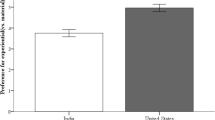Abstract
In this study, an experiment was conducted to investigate the effect of gift cost, gift type, and buyer-vendor relationship status on purchasing executives’ feelings of indebtedness, perceived manipulation, and intentions to reciprocate vendor gifts. The findings indicate that the likelihood of a business gift being reciprocated depends on the type of vendor gift received, the extent to which the buyer experiences a sense of indebtedness, and buyer perceptions of the level of manipulation associated with the gift. Evidence also indicates that the level of perceived manipulation associated with a gift is based on considerations of gift cost and type with respect to the buyer-vendor relationship status.
Similar content being viewed by others
References
Armstrong, J. Scott and Terry S. Overton. 1977. “Estimating Nonresponse Bias in Mail Surveys.”Journal of Marketing Research 14 (August): 396–402.
“The Art of Corporate Gift Giving.” 1993.Incentive 167 (August): S1–S27.
Baumhart, Raymond C. 1961. “How Ethical Are Businessmen?”Harvard Business Review 39 (July–August): 6–19, 156–176.
Becker, Lawrence C. 1986.Reciprocity. London: Routledge & Kegan Paul.
Belk, Russell W. 1979. “Gift-Giving Behavior.” InResearch in Marketing. Vol. 2. Ed. Jagdish N. Sheth. Greenwich, CT: JAI Press, 95–126.
Beltramini, Richard F. 1992. “Exploring the Effectiveness of Business Gifts: A Controlled Field Experiment.”Journal of the Academy of Marketing Science 20 (Winter): 87–91.
Bollen, Kenneth A. 1989.Structural Equations with Latent Variables. New York: Wiley.
Brehm, Jack W. and Ann Himelick Cole. 1966. “Effect of a Favor Which Reduces Freedom.”Journal of Personality and Social Psychology 3 (April): 420–426.
Brenner, Steven N. and Earl A. Molander. 1977. “Is the Ethics of Business Changing?”Harvard Business Review 55 (January–February): 57–71.
Caplow, Theodore. 1982. “Christmas Gifts and Kin Networks.”American Sociological Review 47 (June): 383–392.
Chonko, Lawrence B. and Shelby D. Hunt. 1985. “Ethics and Marketing Management: An Empirical Examination.”Journal of Business Research 13 (August): 339–359.
Churchill, Gilbert A., Jr. 1979. “A Paradigm for Developing Better Measures of Marketing Constructs.”Journal of Marketing Research 16 (February): 323–332.
Cialdini, Robert B. 1985.Influence: Science and Practice. Glenview, IL: Scott, Foresman.
Cohen, Jacob and Patricia Cohen. 1983.Applied Multiple Regression/Correlation Analysis for the Social Sciences. Second Edition. Hillsdale, NJ: Lawrence Erlbaum.
Cronbach, Lee J. 1951. “Coefficient Alpha and the Internal Structure of Tests.”Psychometrika 16 (September): 297–334.
Crosby, Lawrence A., Kenneth R. Evans, and Deborah Cowles. 1990. “Relationship Quality in Services Selling: An Interpersonal Influence Perspective.”Journal of Marketing 54 (July): 68–81.
Duncan, Otis Dudley. 1975.Introduction to Structural Equation Models. New York: Academic Press.
Dwyer, F. Robert, Paul H. Schurr, and Sejo Oh. 1987. “Developing Buyer-Seller Relationships.”Journal of Marketing 51 (April): 11–28.
Ferrell, O. C. and Larry G. Gresham. 1985. “A Contingency Framework for Understanding Ethical Decision Making in Marketing.”Journal of Marketing 49 (Summer): 87–96.
Forker, Laura B. and Robert L. Janson. 1990. “Ethical Practices in Purchasing.”Journal of Purchasing and Materials Management 26 (Winter): 19–26.
Frazier, Gary L., Robert E. Spekman, and Charles R. O’Neal. 1988. “Just-In-Time Exchange Relationships in Industrial Markets.”Journal of Marketing 52 (October): 52–67.
Gibson, Richard. 1989. “Latest in Corporate Freebies Try to Be Classy Instead of Trashy.”Wall Street Journal 69 (August 7): B4.
Gouldner, Alvin W. 1960. “The Norm of Reciprocity: A Preliminary Statement.”American Sociological Review 25 (April): 161–178.
Greenberg, Martin S. 1980. “A Theory of Indebtedness.” InSocial Exchange: Advances in Theory and Research. Eds. Kenneth J. Gergen, Martin S. Greenberg, and Richard H. Willis. New York: Plenum, 1–26.
Greenberg, Martin S., Myron W. Block, and Michael A. Silverman. 1971. “Determinants of Helping Behavior: Person’s Rewards versus Other’s Costs.”Journal of Personality 39 (March): 79–93.
Greenberg, Martin S. and David M. Frisch. 1972. “Effect of Intentionality on Willingness to Reciprocate a Favor.”Journal of Experimental Social Psychology 8 (March): 99–111.
Janson, Robert L. 1988.Purchasing Ethical Practices. Tempe, AZ: National Association of Purchasing Management.
Kahn, Arnold. 1972. “Reactions to Generosity or Stinginess from an Intelligent or Stupid Work Partner: A Test of Equity Theory in a Direct Exchange Relationship.”Journal of Personality and Social Psychology 21 (January): 116–123.
Kenny, David A. 1979.Correlation and Causality. New York: Wiley.
Laczniak, Gene R. and Patrick E. Murphy. 1993.Ethical Marketing Decisions: The Higher Road. Boston: Allyn & Bacon.
Lerner, Melvin J. and Rosemary R. Lichtman. 1968. “Effects of Perceived Norms on Attitudes and Altruistic Behavior toward a Dependent Other.”Journal of Personality and Social Psychology 9 (July): 226–232.
Levine, Joanne. 1989. “Even Santa Had Helpers.”Sales and Marketing Management 141 (August): 56–62.
Lowe, Charles A. and Joel W. Goldstein. 1970. “Reciprocal Liking and Attributions of Ability: Mediating Effects of Perceived Intent and Personal Involvement.”Journal of Personality and Social Psychology 16 (October): 291–297.
Malinowski, Bronislaw. 1964. “The Principle of Give and Take.” InSociological Theory: A Book of Readings. Second Edition. Eds. Lewis A. Coser and Bernard Rosenberg. New York: Macmillan, 71–74.
Mauss, Marcel. 1954.The Gift: Forms and Functions of Exchange in Archaic Societies. English translation by Ian Cunnison. Glencoe, IL: Free Press.
Neter, John, William Wasserman, and Michael H. Kutner. 1985.Applied Linear Statistical Models. Second Edition. Homewood, IL: Irwin.
Nunnally, Jum C. 1978.Psychometric Theory. Second Edition. New York: McGraw-Hill.
Pedhazur, Elazar J. 1982.Multiple Regression in Behavioral Research: Explanation and Prediction. Second Edition. New York: Holt, Rinehart & Winston.
Perdue, Barbara C. and John O. Summers. 1986. “Checking the Success of Manipulations in Marketing Experiments.”Journal of Marketing Research 23 (November): 317–326.
Pruitt, Dean G. 1968. “Reciprocity and Credit Building in a Laboratory Dyad.”Journal of Personality and Social Psychology 8 (February): 143–147.
Pryor, Frederic L. and Nelson H. H. Graburn. 1980. “The Myth of Reciprocity.” InSocial Exchange: Advances in Theory and Research. Eds. Kenneth J. Gergen, Martin S. Greenberg, and Richard H. Willis. New York: Plenum, 215–237.
Rudelius, William and Rogene A. Buchholz. 1979. “What Industrial Purchasers See as Key Ethical Dilemmas.”Journal of Purchasing and Materials Management 15 (Winter): 2–20.
Scanzoni, John. 1979. “Social Exchange and Behavioral Interdependence.” InSocial Exchange in Developing Relationships. Eds. Robert Lee Burgess and Ted L. Huston. New York: Academic Press, 61–98.
Schopler, John and Vaida Diller Thompson. 1968. “Role of Attribution Processes in Mediating Amount of Reciprocity for a Favor.”Journal of Personality and Social Psychology 10 (November): 243–250.
Sharma, Subhash, Richard M. Durand, and Oded Gur-Arie. 1981. “Identification and Analysis of Moderator Variables.”Journal of Marketing Research 18 (August): 291–300.
Sherry, John F., Jr. 1983. “Gift Giving in Anthropological Perspective.”Journal of Consumer Research 10 (September): 157–168.
Shimp, Terence A., Eva M. Hyatt, and David J. Snyder. 1991. “A Critical Appraisal of Demand Artifacts in Consumer Research.”Journal of Consumer Research 18 (December): 273–283.
Swan, John E., David R. Rink, G. E. Kiser, and Warren S. Martin. 1984. “Industrial Buyer Image of the Saleswoman.”Journal of Marketing 48 (Winter): 110–116.
Trawick, I. Frederick, John E. Swan, Gail W. McGee, and David R. Rink. 1991. “Influence of Buyer Ethics and Salesperson Behavior on Intention to Choose a Supplier.”Journal of the Academy of Marketing Science 19 (Winter): 17–23.
Trawick, I. Frederick, John E. Swan, and David R. Rink. 1989. “Industrial Buyer Evaluation of the Ethics of Salesperson Gift Giving: Value of the Gift and Customer vs. Prospect Status.”Journal of Personal Selling and Sales Management 9 (Summer): 31–37.
Author information
Authors and Affiliations
Additional information
He received his Ph.D. from the University of Arkansas in 1987. He has contributed to such journals as theJournal of the Academy of Marketing Science, Journal of Business Research, andJournal of Professional Services Marketing.
He received his doctorate in marketing from the University of Kentucky. His research has been published in theJournal of the Academy of Marketing Science, Journal of Retailing, andJournal of Business Research.
Rights and permissions
About this article
Cite this article
Dorsch, M.J., Kelley, S.W. An investigation into the intentions of purchasing executives to reciprocate vendor gifts. JAMS 22, 315–327 (1994). https://doi.org/10.1177/0092070394224001
Issue Date:
DOI: https://doi.org/10.1177/0092070394224001




